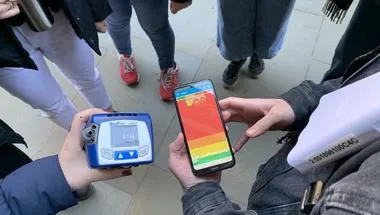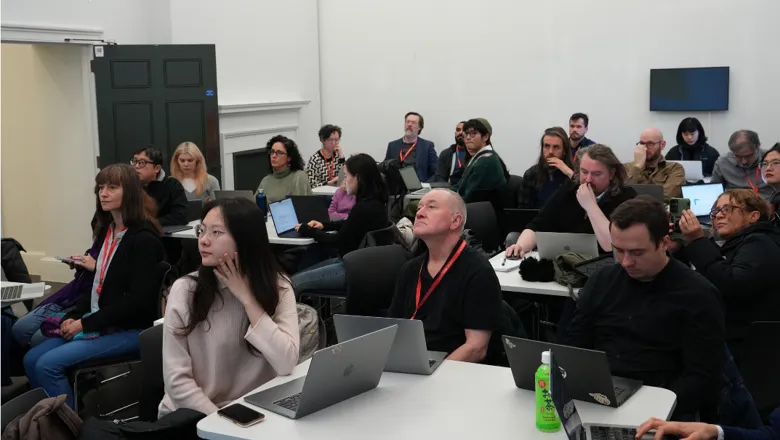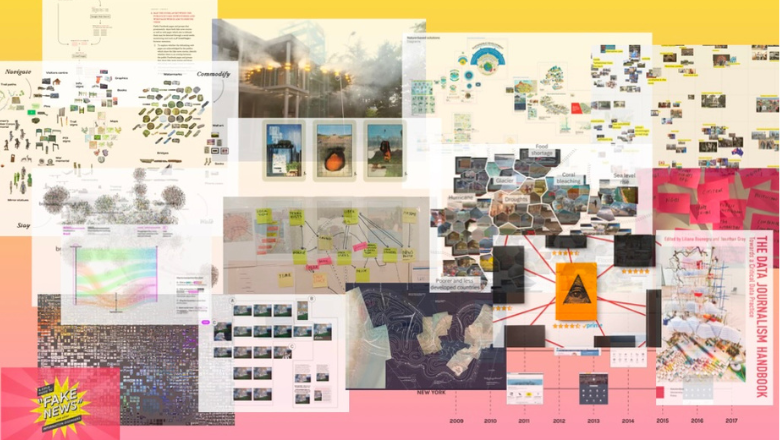
Dr Liliana Bounegru
Senior Lecturer in Digital Media, Culture and Society
Contact details
Biography
Liliana Bounegru is a Senior Lecturer in Digital Media, Culture and Society in the Department of Digital Humanities, King's College London.
Previously she was a postdoctoral research fellow at the Oxford Internet Institute (University of Oxford). Since 2013 she has been a researcher at the Digital Methods Initiative (University of Amsterdam), where she also acted as Managing Director between 2014 and 2016. She is also a research associate at the Sciences Po Paris médialab, where she was a visiting researcher and lecturer in 2016. She obtained her double PhD degree (cum laude) from the University of Groningen and Ghent University. She co-founded the Public Data Lab, a network of research labs which seeks to facilitate research, democratic engagement and public debate around the future of the data society. In parallel to her academic work, she was Data Journalism Program Lead at the European Journalism Centre.
Her work covers new media, digital culture, digital journalism, data journalism and digital methods, and has been published in New Media & Society, Big Data & Society, Visual Communication and Digital Journalism. She is co-editor of The Data Journalism Handbook (O’Reilly Media, 2012; University of Amsterdam Press, forthcoming), translated into fifteen languages. She is co-investigator of A Field Guide to Fake News and Other Information Disorders, a transnational, multi-institutional research collaboration to develop digital methods to trace the circulation of political misinformation, junk news, memes and trolling practices online (also available in Japanese).
She has taught courses in digital methods, data journalism, digital journalism and controversy mapping at King’s College London, the University of Siegen, University of Amsterdam, Sciences Po and the Paris School of International Affairs.
More about her can be found at lilianabounegru.org.
Research interests and PhD supervision
Her research interests include intersections between the following topics: digital media, digital culture, digital journalism, data journalism, climate change, misinformation, and the following approaches: inventive methods for new media research, digital methods for social and cultural studies, infrastructure studies, platform studies, issue mapping and controversy mapping.
Liliana welcomes PhD applications related to the above.
Teaching
Liliana is involved in teaching courses on digital methods for social and cultural studies, data journalism, digital journalism, audience studies, visual methodologies and information visualisation.
Expertise and public engagement
Liliana also has a professional background in media and journalism. In parallel to her academic work, she led the data journalism unit at the European Journalism Centre, where she designed and coordinated massive open online courses (MOOCs), online publications, conferences and trainings. She has contributed to the Harvard Business Review, BuzzFeed News, PBS MediaShift, and the Nieman Lab, and her work has been featured in a number of publications, including The New York Times, The Guardian, The Asahi Shimbun, Columbia Journalism Review and Global Voices.
Research

Centre for Digital Culture
The Centre for Digital Culture at King’s College London is an interdisciplinary research centre promoting research and debate on digital culture

Engaged Research-led Teaching
This project explores how researchers, students & external organisations might work as co-inquirers, taking into account varied perspectives, needs & concerns.
Project status: Completed

SUPERB: Upscaling Forest Restoration
A large and powerful multi-stakeholder network aimed at creating transformative change towards large-scale restoration, part of a major Horizon2020 programme.
Project status: Ongoing

KingsCAT: Capture and Analysis Tool for Social Media Research at King’s College London
KingsCAT is an instance of the open source 4CAT: Capture and Analysis Toolkit set up to support interdisciplinary and collaborative social media research.
Project status: Ongoing

Centre for Data Futures
Bringing together interdisciplinary experts to focus on participatory infrastructure throughout the life of data-reliant tools.
News
Digital Futures Institute announces eleven new Fellows for 2025-26
Eleven interdisciplinary projects awarded Fellowships from the Digital Futures Institute for the 2025-26 cohort.

'Gather, explore, collaborate' – new toolkit to enrich digital culture research at King's
KingsCAT is a cross-faculty initiative coordinated by the Digital Future Institute’s Centre for Digital Culture and the Department of Digital Humanities in...

SUPERB researchers contribute to forest restoration across Europe
Liliana Bounegru and Jonathan Gray co-lead a team at the Department of Digital Humanities, exploring how humanities-based digital methods can contribute...

New edition of Data Journalism Handbook now open access with Amsterdam University Press
The book provides a wide-ranging collection of perspectives on how data journalism is done around the world.

New AHRC funded project investigates COVID-19 conspiracy theories
AHRC project explores the WHO’s warning about an ‘infodemic’ and the harmful impact of conspiracy theories and misinformation during a global pandemic.

Events

Digital Methods x Social and Policy Research — Tools, Examples and Starting Points
How can digital material from the web and social media be gathered and analysed for social and policy research?
Please note: this event has passed.

AI and Data Ecologies: A Discussion Panel
The Global Digital Cultures Research Group in the Department of Digital Humanities at King's hosts a discussion panel on AI & Data Ecologies.
Please note: this event has passed.

KingsCAT training for public health and emergency preparedness research
How can social media data be repurposed for research on public health and emergency preparedness?
Please note: this event has passed.
Research

Centre for Digital Culture
The Centre for Digital Culture at King’s College London is an interdisciplinary research centre promoting research and debate on digital culture

Engaged Research-led Teaching
This project explores how researchers, students & external organisations might work as co-inquirers, taking into account varied perspectives, needs & concerns.
Project status: Completed

SUPERB: Upscaling Forest Restoration
A large and powerful multi-stakeholder network aimed at creating transformative change towards large-scale restoration, part of a major Horizon2020 programme.
Project status: Ongoing

KingsCAT: Capture and Analysis Tool for Social Media Research at King’s College London
KingsCAT is an instance of the open source 4CAT: Capture and Analysis Toolkit set up to support interdisciplinary and collaborative social media research.
Project status: Ongoing

Centre for Data Futures
Bringing together interdisciplinary experts to focus on participatory infrastructure throughout the life of data-reliant tools.
News
Digital Futures Institute announces eleven new Fellows for 2025-26
Eleven interdisciplinary projects awarded Fellowships from the Digital Futures Institute for the 2025-26 cohort.

'Gather, explore, collaborate' – new toolkit to enrich digital culture research at King's
KingsCAT is a cross-faculty initiative coordinated by the Digital Future Institute’s Centre for Digital Culture and the Department of Digital Humanities in...

SUPERB researchers contribute to forest restoration across Europe
Liliana Bounegru and Jonathan Gray co-lead a team at the Department of Digital Humanities, exploring how humanities-based digital methods can contribute...

New edition of Data Journalism Handbook now open access with Amsterdam University Press
The book provides a wide-ranging collection of perspectives on how data journalism is done around the world.

New AHRC funded project investigates COVID-19 conspiracy theories
AHRC project explores the WHO’s warning about an ‘infodemic’ and the harmful impact of conspiracy theories and misinformation during a global pandemic.

Events

Digital Methods x Social and Policy Research — Tools, Examples and Starting Points
How can digital material from the web and social media be gathered and analysed for social and policy research?
Please note: this event has passed.

AI and Data Ecologies: A Discussion Panel
The Global Digital Cultures Research Group in the Department of Digital Humanities at King's hosts a discussion panel on AI & Data Ecologies.
Please note: this event has passed.

KingsCAT training for public health and emergency preparedness research
How can social media data be repurposed for research on public health and emergency preparedness?
Please note: this event has passed.
